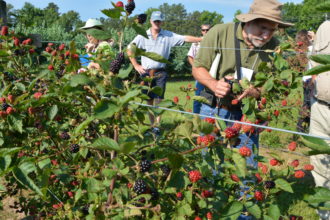LITTLE ROCK, Arkansas – Central Arkansas was the location for the spring 2015 tour for the SARE/NACAA Sustainable Agriculture Fellows program, where Cooperative Extension agents from across the country spent several days learning more about sustainable agriculture concepts.
The program, sponsored by Sustainable Agriculture Research and Education (SARE) and the National Association of County Agricultural Agents (NACAA), challenges county agents to assess strengths, weaknesses, and relevant sustainable agriculture applications in current agricultural systems. A major component involves tours aimed at exposing agents to the huge diversity of sustainability in practice.
This spring’s program brought participants to farms in Arkansas and was hosted by the University of Arkansas.
“Even though I’m an Extension livestock specialist, on our SARE Fellows tour I could see how the concepts of sustainability apply across all types of agricultural enterprises,” said SARE Fellows Susan Kerr, northwest livestock and dairy regional specialist at Washington State University. “We saw excellent examples of IPM (Integrated Pest Management) on a berry farm; a vegetable farm with high social capital but production challenges; a grazing operation that was under utilizing its grass resources; and a tree nut farm where the savvy owner kept close track of international market trends so he could capture a high price for his product.”
During the tour, SARE Fellows used the Reading the Farm training tool to conduct in-depth analyses on North Pulaski Farm, an organic vegetable and fruit farm north of Little Rock. Reading the Farm looks at farms as whole systems; participants learn to assess how economic, environmental, and social factors interconnect and influence farmer decision-making.
"The Reading the Farm exercise completely changed my perspective relative to assessing the social and economic aspects of farming sustainability,” said SARE Fellows Patrick Byers, regional horticulture specialist with University of Missouri Extension. “This tool has already benefited me in my programming efforts with farmers in Missouri, and would without a doubt benefit my MU Extension colleagues.”
Fellows also toured several other agricultural production systems in Arkansas. These farms and systems included Wye Mountain Flowers and Berries, which grows flowers and U-pick blueberries and blackberries; Heifer Ranch; a pecan orchard; and rice production on an agronomic farm.
They also met with the co-chair of the University of Arkansas' Arkansas Discovery Farms program to learn how the university is working with farms to collect data and make recommendations.
About the SARE/NACAA Sustainable Agriculture Fellows program. The two-year Fellows program provides a training opportunity that enhances understanding of sustainable agriculture and provides broad-based, national exposure to successful and unique sustainable agriculture programs. Participating Fellows are better able to create new programs that meet the needs of their local clientele. Learn more about the Sustainable Agriculture Fellows program, including biographies of current Fellows.
--30—
Published by the Southern Region of the Sustainable Agriculture Research and Education (SARE) program. Funded by the USDA National Institute of Food and Agriculture (NIFA), Southern SARE operates under cooperative agreements with the University of Georgia, Fort Valley State University, and the Kerr Center for Sustainable Agriculture to offer competitive grants to advance sustainable agriculture in America's Southern region.
